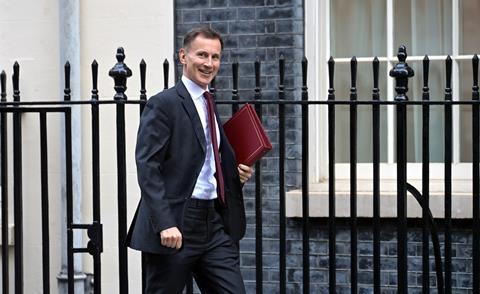Bodies criticise chancellor for not recommitting to housing targets, replacing Help to Buy and failing to make more funding available to make homes energy efficient

Today’s Budget was a “missed opportunity” with housing “notable by its absence”, sector bodies said in reaction to the chancellor’s fiscal statement.
Jeremy Hunt did announce £760m of funding for regeneration schemes and devolution of affordable housing funding to the mayors of Greater Manchester and the West Midlands.
He also confirmed there would be 12 investment zones which would benefit from tax breaks to boost growth. These however will not benefit from ‘top-down’ planning liberalisation. Instead combined authorities will instead have to show in their zone proposals they have an “ambitious offer” to speed up planning.
The Spring Budget documents also committed to further support to “ensure ‘nutrient neutrality’ obligations can be efficiently delivered”.
The Department for Levelling Up, Housing and Communities will soon launch a call to evidence from local planning authorities, and committed to backing high quality, locally-led nutrient mitigation schemes. Thousands of homes are currently being held up by rules that do not allow councils to allow developments that could add extra nitrates and phosphates to waterways.
Geeta Nanda, chair of the group of London housing associations the G15 and chief executive of MTVH, said: “On wider housing challenges, there was precious little in the chancellor’s statement. It is now vital that the government works with us to help make progress on giving more people access to affordable homes that are safe, warm, and dry.”
Gavin Smart, chief executive of the membership organisation the Chartered Institute of Housing, said: “Housing was notable by its absence”. The CIH was disappointed the chancellor left local housing allowance rates frozen at 2020 levels.
Ben Woolman, director at property firm Woolbro Group, believed there was a “bewildering absence of support for first-time buyers”. He said the “obvious and overdue starting point” to help first-time buyers would be to replace the Help to Buy scheme, which is ending at the end of this month.
Woolman added: “Secondly, it must renege on plans to make housing targets for advisory only.” Housing secretary backtracked on keeping local targets as mandatory in December last year, which has led to several councils pausing their local plans as a result.
Iain Crawford, chief executive of the real estate investment fund Alliance Fund, agreed: “It’s disappointing not to see any new ambitions with regard to housing delivery in today’s budget. There’s been a severe lack of new homes reaching the market in recent years and so you would have hoped the issue of housing supply would have been higher on the agenda.”
More on Budget 2023
Hunt announces £760m of regeneration funding and devolution deals
Investment Zone proposals must have ‘ambitious’ planning acceleration offer
Bricklayers added to list of trades with shortages overseas labour will now be allowed to plug
Budget 2023: key measures at-a-glance
Government pledges support to help developers deliver ‘nutrient neutral’ sites
Chris Hodgkinson, managing director at consultancy House Buyer Bureau, mentioned that the property market needed help after the “shambolic mini budget”.
“The property market has been treading water since last September’s shambolic mini budget and we were looking to the spring statement for a shot in the arm that would reignite the furnaces of buyer demand and help negate any prolonged period of subdued activity.”
The housing market was sent into turmoil after the mini-budget last year and mortgages hit 14-year highs.
But Melanie Leech, chief executive of the British Property Federation, was positive about the chancellor’s statement today.
“The announcement of ‘trailblazer’ deals with Greater Manchester and the West Midlands is welcome,” she said.
“Both regions understand the critical importance of real estate to delivering better outcomes for communities and we look forward to working with them to unlock new opportunities for investment.”
These deals will give Greater Manchester and West Midlands combined authorities greater power over, for example, housing, local transport and net zero priorities.











No comments yet